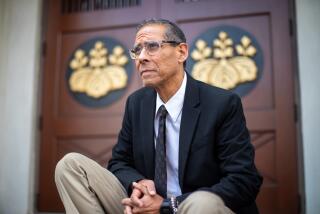DNA Is Linked to 1993 Slaying
- Share via
A parolee with a lengthy rap sheet was charged with capital murder after a statewide DNA database linked him to a 1993 sexual assault and killing of a woman at a South Los Angeles carwash, authorities said Monday.
The arrest of Charles Augustus Jones, 41, is believed the first by the Los Angeles Police Department and among the first in California to result from Proposition 69. The initiative passed by voters in November requires that DNA samples be collected from every person convicted of a felony in the state.
Jones, who was charged Friday, is accused of killing Mara Robinson, 34, whose body was discovered June 9, 1993, inside a restroom by workers at a carwash at 1624 W. Florence Ave.
At the time, other than the DNA evidence the perpetrator left behind, police had few clues as to who strangled Robinson -- last seen alive by her family the evening before she was found.
“No leads; no suspects,” said Det. Vivian Flores of the LAPD’s cold-case homicide unit, which revived Robinson’s murder investigation more than a decade after the crime. “It was a female found in a bathroom.... There was nothing to go on.”
But recently, detectives got a break. After they analyzed biological evidence collected from the crime scene and obtained a full DNA profile, they fed it into state and federal databases and got a link to Jones.
Jones, who had an extensive record of mostly drug-related convictions in California and Louisiana, had his DNA cataloged under the new law before his release from prison earlier this year, police said.
To track him down, LAPD investigators contacted authorities in Louisiana. Based on a joint investigation, New Orleans police last month linked Jones to an unsolved 1995 rape there, and authorities issued a warrant for his arrest.
In the New Orleans case, a 38-year woman was attacked in a similar fashion to Robinson but survived, according to the LAPD.
Authorities found Jones in Los Angeles, where he was taken into custody by the Department of Corrections on suspicion of violating his parole agreement. He now faces a possible death penalty if convicted of killing Robinson because of the special circumstance allegation of rape, according to the felony complaint filed by the Los Angeles County district attorney’s office.
“You never get over the death or loss of a child,” said Robinson’s mother in a statement provided by the LAPD. “She was just a very loving woman. She took care of everybody.”
All of California’s 162,000 prison inmates must contribute samples to the DNA database. As of the end of March, DNA samples had been collected from about 94,000 of them, said Margot Bach, a state Department of Corrections spokeswoman.
The department could not estimate how many DNA samples were taken solely as a result of Proposition 69, which took effect Jan. 1 and greatly expanded previous laws. Before, only inmates convicted of serious felonies -- such as murder, rape and kidnapping -- were required to provide DNA.
In 2004, Jones had been sentenced to one year and four months in state prison for possessing a controlled substance, a relatively low-level conviction. He was paroled Jan. 27.
“We benefited from Prop. 69,” Flores said. “This is a great thing that voters passed.”
One by one, the cold-case unit has been activating the city’s thousands of unsolved homicides from the past four decades.
“There are a lot of guys in custody now who are sweating. It’s just a matter of time. We will catch up” to them, Flores said.
More to Read
Sign up for Essential California
The most important California stories and recommendations in your inbox every morning.
You may occasionally receive promotional content from the Los Angeles Times.













